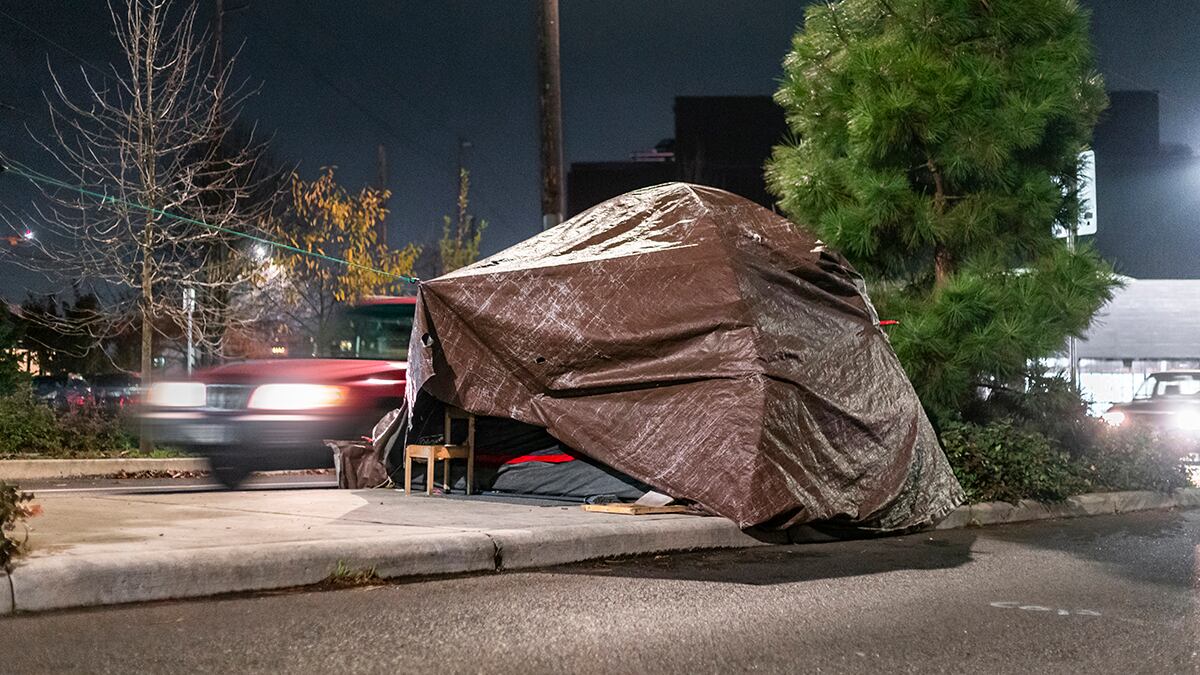If a majority of the Portland Planning and Sustainability Commission has its way, new private buildings downtown will be required to include spaces where houseless Portlanders can "rest," which could include sleeping and pitching tents.
"The heart of the issue is that we have increasing housing costs and we cannot support all of the people who live here now and are going to live here in the future," says Oriana Magnera, the planning commissioner who pushed hardest to include the new language.
Magnera's proposal would stretch what's asked of developers and owners of new private buildings, such as stores and apartment complexes.
Her idea initially drew support from all her colleagues, but after further discussion encountered strong pushback from a minority of commissioners, who may still try to derail it before it reaches the City Council.
The controversial proposal comes as City Hall tries a variety of ways to come to terms with a housing shortage that has left thousands of people sleeping in the wintry streets. In recent weeks, as WW has reported, the city has rolled out a new plan for how first responders respond to non-emergency 911 calls and floated a proposal to ban camping adjacent to Providence Park and other spectator venues.
The newest issue arose as the planning commission nears the conclusion of a three-year effort to streamline the city's design review process.
At its Nov. 12 meeting, the commission began a routine walk-through of draft language for new design guidelines, which the city defines as "mandatory approval criteria that must be met as part of design review."
There are a dozen such guidelines, but the discussion ground to a halt at No. 6, which said the exterior spaces of new buildings must "provide opportunities to pause, sit and interact."
Magnera, who works as the director of climate and energy policy at Verde, a Northeast Portland environmental justice nonprofit, stopped the conversation and pushed to add the words "rest and be welcome" to that guideline. She explained that public spaces around buildings often include "benches but not a lot of place to pitch a tent."
"Sitting is brief," she said, "but the reality of the housing shortage is, folks need to rest on a longer-term scale."
"We need spaces where folks can feel supported and safe," she told her fellow commissioners.
Magnera's proposal generated a spirited conversation. Several commissioners maintained support for Magnera's change. Commissioner Steph Routh said the commission should make design review "more permissive and inclusive," rather than using "defensive measures" to exclude people.

Commission chairwoman Katherine Schultz, managing director of GBD Architects, said she couldn't support Magnera's proposal and called for a revote. Joining her in opposition were Mike Houck, a naturalist at the Urban Greenspaces Institute; Ben Bortolazzo, director of planning and design at Otak, and Jeff Bachrach, a land use lawyer. Ultimately, the commission voted 5-4 to approve the more expansive language. (Houck, Schultz and Bortolazzo didn't return calls or declined to comment.)
Bachrach is strongly opposed to the idea of requiring developers to include design features that would promote camping, saying it is counter to existing policy and beyond the purview of the commission.
"We don't have a policy in this city—whether it's for public parks or quasi-public open spaces—that says we want homeless people sleeping outside and pitching tents," Bachrach says. "To the contrary, we are building more shelters and discouraging tents."
Portland has long prided itself on a robust design review process for new development. The idea is to ensure that projects are built to high standards of both quality and aesthetics. Officials expect a continuing flood of newcomers—123,000 new households by 2035.
For many years, developers have complained Portland's design review process often adds unnecessary time and expense to construction. Those complaints gained traction as housing prices and rents soared. In 2016, city officials hired outside consultants to begin reforming the process.
Magnera's proposal would run counter to efforts to reduce design review requirements. Bachrach and other critics of the proposed guideline say it is an example of mission creep.
"It's more fun to deal with broad public policy issues than figure out how to make a zoning code more effective," Bachrach says. "I hope the Design Commission will kill this idea."
Magnera, Bachrach and their colleagues are slated to meet Dec. 17 and send their recommendations to the Design Commission, which will send its final product to the City Council.
Magnera, however, says she's more determined than ever to use city code to carve out space for people who have none. "I'm going to keep pushing," she says. "I feel it's my role to speak up for people who don't have a voice."
